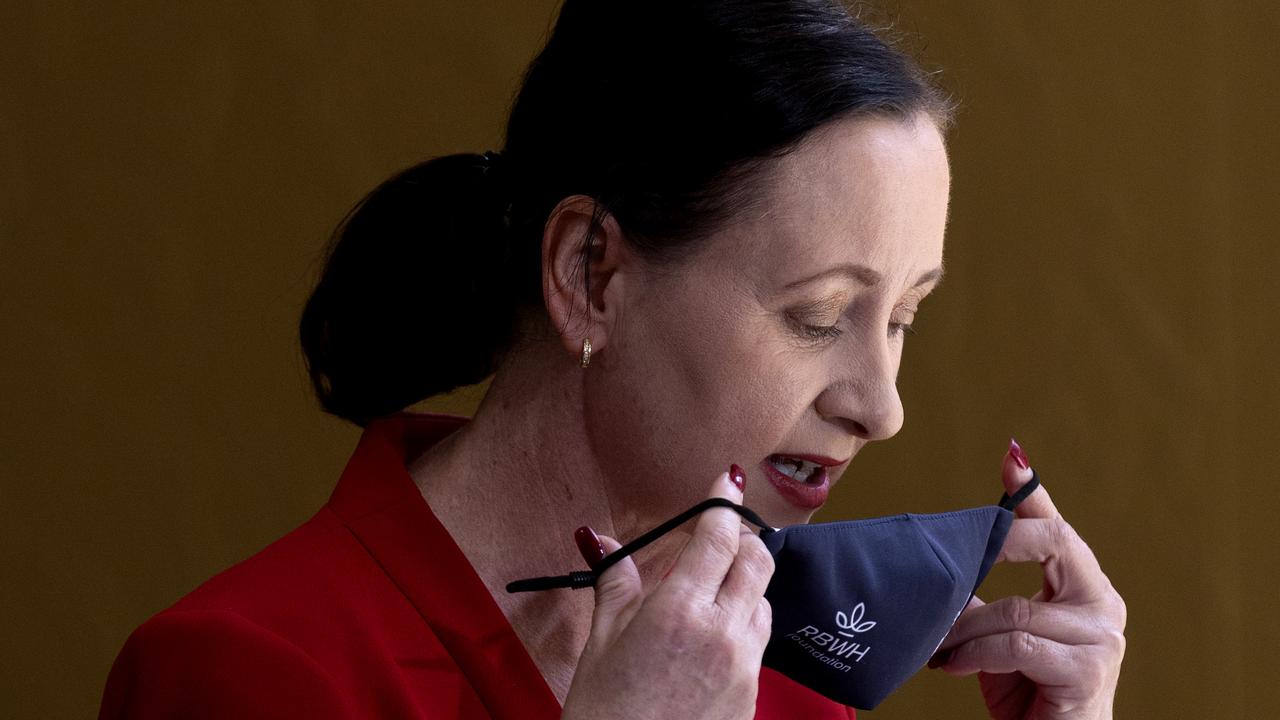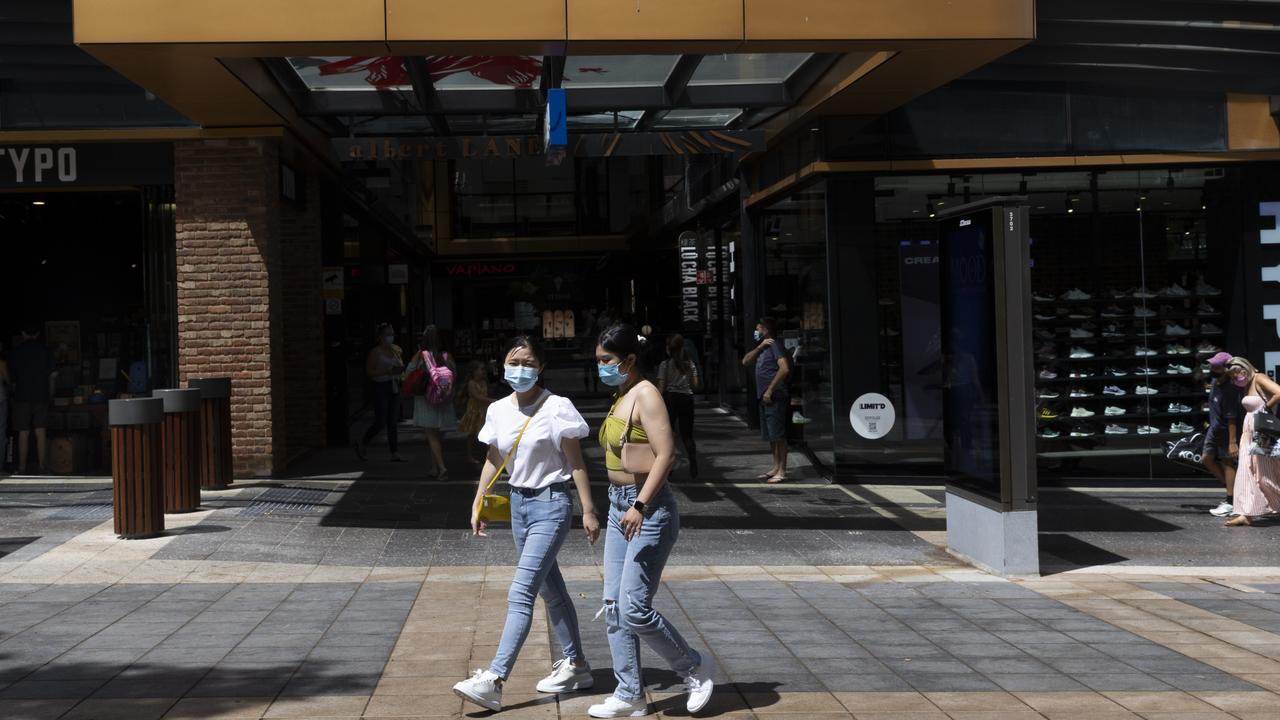One in five Queensland retailers closed or reduced services because of Covid outbreak
Even more Queensland retailers will have to shut up shop as the Omicron outbreak peaks in the coming weeks, with half the state’s businesses already facing significant constraints on the availability of staff and reduced patronage.
QLD Coronavirus News
Don't miss out on the headlines from QLD Coronavirus News. Followed categories will be added to My News.
Yvette D’Ath says only the vulnerable and unvaccinated should consider limiting their movements, as new figures reveal one in five retailers have been forced to close their doors or reduce services amid the Omicron outbreak.
Industry leaders are warning even more businesses will have to shut up shop in the coming weeks, with half the state’s businesses already facing significant constraints on the availability of staff.
The Queensland Health Minister on Wednesday clarified that those who were vaccinated and were not vulnerable did not need to limit their movements over the next six weeks.
But Ms D’Ath urged Queenslanders to be sensible, encouraging them to adopt safety measures such as social distancing and mask wearing.
“Wear your mask and wear it properly,” she said.
“Wear it everywhere we’ve asked you to wear it and then if you find yourself in situations where even if you’re outdoors … all these measures will make a difference.
“The Premier has said it is the most vulnerable in the community that are most at risk and that we want to protect and we simply recommend that they may want to consider – not staying at home and not moving – but to limit going into those areas that are heavily populated.”

Ms D’Ath reiterated that people should work from home where possible as the state braces for its Covid peak in the coming weeks.
Her comments come as new figures from the Chamber of Commerce and Industry Queensland reveal close to 50 per cent of businesses have experienced major or critical constraint on the availability of staff in recent weeks.
Amanda Rohan – the peak business body’s general manager of policy and advocacy – said businesses were at a “crunch point” and that a lack of rapid antigen tests was hindering their ability to reopen and recover.
“CCIQ data shows close to 85 per cent of businesses’ ability to maintain normal operational hours or service delivery had been impacted since Queensland borders reopened and the impact of the Omicron strain emerged in Queensland,” Ms Rohan said.
“CCIQ has been saying for months and long before borders reopened businesses needed clarity and certainty around access to rapid antigen testing as a first line of defence for their staff and to help them plan for workforce shortages, return to work and ongoing recovery.”
Ms Rohan stressed the importance of isolation requirements being “consistently reviewed” for Covid-positive and close contact staff, as she suggested staff shortages were impacting some industries more than others.
“We’re hearing there is a need for those most impacted businesses to be financially supported,” she said.
“Any support package made available must be directly targeted and of joint state and federal support.”
The National Retail Association (NRA) has estimated about 5,000 Queensland retail businesses – the equivalent of one in five in the state – have already been impacted by Covid, based on feedback from their members.
The NRA’s chief executive Dominique Lamb said staff shortages due to workers being forced into isolation meant many Queensland businesses have had to limit their services or opt to close.
She warned that smaller businesses with fewer employees – particularly those in the hospitality and food sector – were very vulnerable to staff shortages.
“We know that these number as we’ve heard from the chief health officer are going to spike as we move into obviously late January, and into February,” Ms Lamb said.
“We know for many small businesses that they simply don’t have the staff to basically shift out different groups of people to replace each other if there are positive cases.
“And in many small businesses’ case, they can be one or two people and it can shut an entire business down for a week or so.”

Brisbane Junior Chamber of Commerce president Nathan Schokker also said he expected an increasing number of businesses to make the tough decision to close their doors in the coming four to six weeks.
“The first wave that we’ve already seen has been a lot of coffee shops, cafes, restaurants that have made those decisions – but that’s only going to spread wider,” he said.
“From both state and federal government levels, if they’re not seriously talking about it and thinking about some sort of business support packages, then we’re going to be in a lot more hurt.”
C’est Bon owner and director, Andy Ashby, said he was worried about staff shortages when his Woolloongabba restaurant reopens next week following a New Year break.
“Being the owner and director, operationally we’re walking on eggshells as everyone else is at the moment,” he said.
“The rules just keep getting changed left, right and centre – and all we want is clarity.”

Owner of Shades nightclub, Christian Trick, said his staff numbers had roughly halved because they were in isolation.
He said it was a “scary” time as mass isolations and the general fear of going out saw a dramatic drop in patrons at his nightclub last weekend.
“It’s my livelihood, I’ve got mortgages like everyone else. The weekend just gone, I lost 12 grand,” Mr Trick said.
“Bills don’t stop, rent doesn’t stop. It’s a scary time.”



